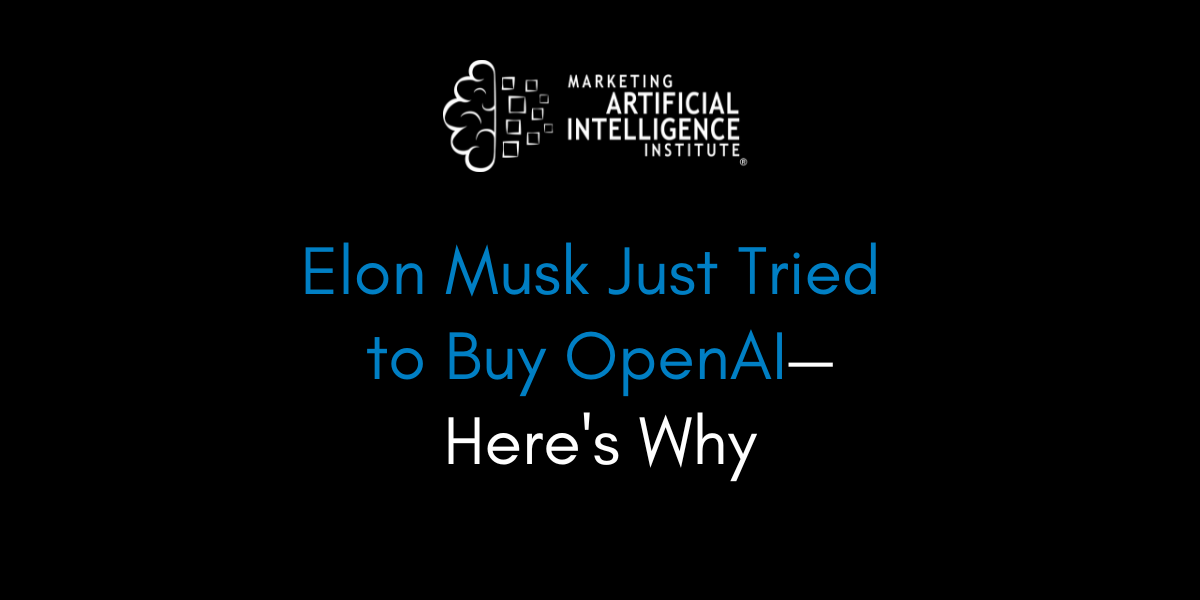Elon Musk just lobbed yet another grenade at OpenAI.
Last week, the billionaire and a group of investors—including his AI company xAI, the investment firm Vy Capital, and Hollywood mogul Ari Emanuel—offered a jaw-dropping $97.4 billion to buy the nonprofit that legally controls OpenAI.
The trouble? OpenAI wants nothing to do with it.
CEO Sam Altman dismissed the offer outright on X with a mocking counterproposal to buy the platform from Musk for $9.74 billion instead. Musk fired back with a single word: “Swindler.”
And the OpenAI board swiftly and unanimously rejected the bid.
What’s really going on here? Why is Musk so intent on disrupting OpenAI? And how does this all tie back to one of Silicon Valley’s most complicated corporate structures?
I got the answers from Marketing AI Institute founder and CEO Paul Roetzer on Episode 136 of The Artificial Intelligence Show.
A $97.4 Billion Bid for a Nonprofit
First, let’s clarify why Musk’s bid is so striking: He’s trying to acquire the nonprofit entity that still holds legal control over OpenAI. Yes, OpenAI operates a for-profit company these days. But from a legal standpoint, the original nonprofit remains in charge.
That’s a big deal because Musk’s massive offer suddenly throws a wrench into OpenAI’s plan to “buy out” the nonprofit. As part of the for-profit transition, OpenAI has been exploring how to compensate the nonprofit fairly for its control. If you’re the nonprofit’s board, you now have a fresh headache on your hands: Musk’s $97.4 billion sets a sky-high benchmark you’d have to explain turning down.
None of this helps OpenAI’s current fundraising push. The company is in the middle of finalizing a new $40 billion round led by SoftBank—one that would nearly double OpenAI’s valuation to $300 billion from just a few months ago, making it one of the world’s most valuable private companies.
Cue Elon Musk, who drops his $97.4 billion bombshell right in the middle of those talks.
Where Did the Bad Blood Come From?
OpenAI and Elon Musk have a history.
Musk co-founded OpenAI back in 2015. But by 2019, tensions exploded behind the scenes. Musk wanted a for-profit transition sooner—and even tried rolling OpenAI into Tesla. He lost a power struggle to Sam Altman, left OpenAI, and has been throwing rocks from the sidelines ever since.
That rocky relationship got personal this year when Sam Altman publicly said he thought Musk was acting out of “insecurity” and said he wished Musk would compete by “building a better product” instead of stirring up drama.
“Elon feels wronged, and that doesn't end well,” says Roetzer.
A Complex—and Confusing—Corporate Structure
Part of what makes Musk’s offer so disruptive is the bizarre structure of OpenAI itself.
Officially, the nonprofit board retains legal control. The for-profit arm handles product launches and massive fundraising. To fully go for-profit, Sam Altman and co. need to do some financial gymnastics to compensate (or buy out) that nonprofit. That’s why you see talk of giving the nonprofit a 25% equity stake in the new for-profit. But in walks Elon, waving $97.4 billion, and that might raise the price.
It’s all about ensuring the nonprofit is compensated fairly for giving up control. And Musk’s unsolicited offer muddies the water considerably.
Is Musk Serious or Just Trolling?
So, is Musk actually trying to buy OpenAI…or just messing with them?
"I don't think he actually thinks he's going to be able to buy OpenAI," says Roetzer. "I think it's largely an attempt to muddy up the waters and create friction for OpenAI."
“He knows he can’t realistically buy OpenAI. He’s just trying to create friction, artificially inflate the company’s value, and slow them down.”
Musk appears content to spark chaos. He’s already sued OpenAI, claiming it violated its nonprofit mandate. A judge recently hinted at siding with OpenAI in that suit, which may be why Musk pivoted to this new, high-profile approach.
“His attorneys probably have a bunch of bullets in the chamber,” Roetzer says. This is just the latest tactic to make life harder for OpenAI, so that Musk's own AI company can gain an advantage.
What’s Next for OpenAI (and the Rest of Us)?
Ultimately, the OpenAI board has already rejected Musk’s bid, so don’t expect a major ownership change. But the fireworks aren’t over. Musk’s ability (and desire) to stir up conflict is clear—and he’s simultaneously launching new models at xAI to compete directly with OpenAI’s ChatGPT.
OpenAI, meanwhile, is forging ahead with a $40 billion fundraising round. They’re trying to untangle their nonprofit structure, finalize a big valuation jump, and keep launching frontier AI models—all while fending off Musk’s interference.
Buckle up. Because when it comes to OpenAI and Elon Musk, this won’t be the last high-stakes stunt we see. And it’s only getting more personal from here.
"I do not think he's going to stop," says Roetzer. "He has no reason to. I think he finds it amusing and he has the resources to do it."
Mike Kaput
As Chief Content Officer, Mike Kaput uses content marketing, marketing strategy, and marketing technology to grow and scale traffic, leads, and revenue for Marketing AI Institute. Mike is the co-author of Marketing Artificial Intelligence: AI, Marketing and the Future of Business (Matt Holt Books, 2022). See Mike's full bio.



